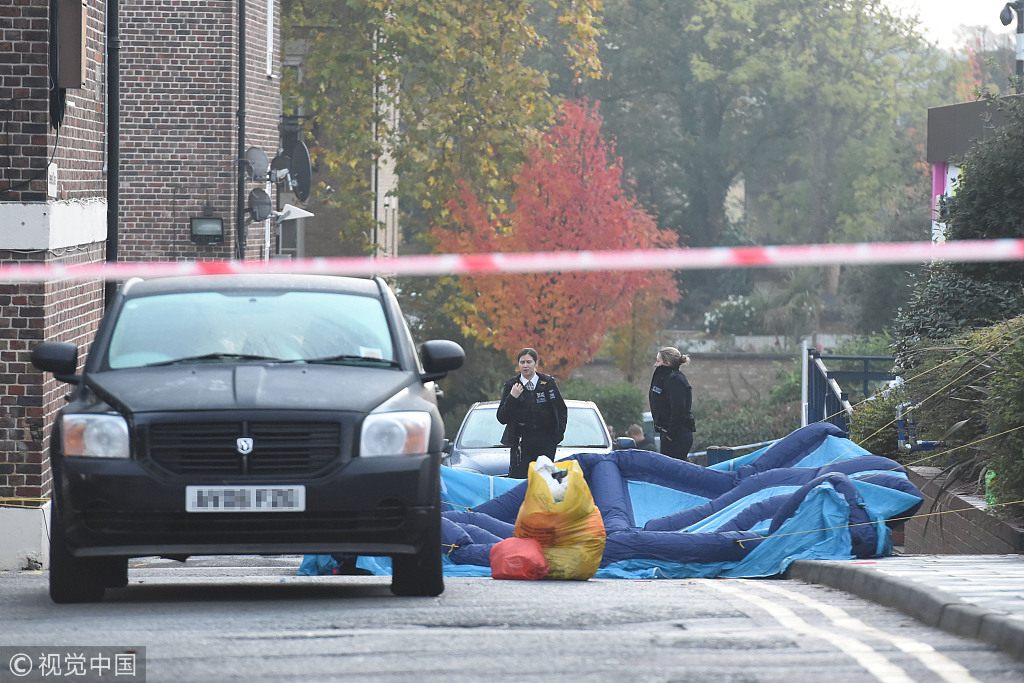Murders bring focus on knife crime
By Jonathan Powell in London | China Daily | Updated: 2018-11-10 09:40
But the main cause of UK capital's rising violence remains unknown

The UK capital's soaring knife violence shows no sign of stopping, with several stabbings in recent days.
Since Oct 31, five men have been stabbed to death on the streets of London - the youngest victim just 15.
This takes the total number of homicides in the city this year to 119, including 74 stabbings and 12 shootings. This compares to 116 for the whole of last year. In total, there were 39,332 knife crimes committed in England and Wales in 2017-18, compared to 23,945 in 2013-14 - a 39 percent increase.
To put homicides in perspective, Berlin recorded 91 homicides in 2017 and Madrid saw 39, while data from 2016 shows Amsterdam had 19, and Rome had 21 murders, although the populations of these European cities are smaller than London's. Outside the European Union, Venezuela's capital Caracas had the most homicides in 2017, with 3,387. Between 1990 and 2003, London's average murder rate was 173.
London Mayor Sadiq Khan has said it could take a whole generation to solve London's violent crime problem, and that to "really make significant progress could take up to 10 years".
The reason behind the rising violence remains unknown. A leaked government report stated that police cuts "likely contributed" to the problem. However, experts also point to factors including single parent families, mental health issues, school exclusions, cuts to youth services, an influx of drugs, social media and even violent music.
According to City Hall figures, police coverage in London is at its lowest rate in 20 years, with 3.3 police officers for every thousand Londoners - the lowest rate since 1998 and 19 percent lower than in 2010.
Research on people treated for knife wounds at the Royal London Hospital between 2004 and 2014 shows a sharp increase in casualties aged 14-16. The number of all under-25s stabbed rose 25 percent each year during that decade, according to findings in the BMJ Open medical journal.
As violence has increased, the use of stop and search by police has fallen: from 1.4 million searches in 2008 to under 400,000 in 2016.
But arresting young people won't stop knife crime, said Labour MP David Lammy, whose Tottenham constituency has seen increased bloodshed. Writing in the Guardian, he highlighted Metropolitan police files that show half of all deaths involving knives are directly linked to the drugs trade and gang turf wars.
"Knife crime is not being driven by youths. It is being driven by a sophisticated network of veteran organized criminals," Lammy said. "This isn't about kids in tracksuits carrying knives, it's about men in suits carrying briefcases. It is serious criminal networks that are exploiting our young people, arming them to the teeth and sending them out to fight turf wars."
Glasgow unit
In September, a London Violence Reduction Unit was set up mirroring the approach taken in Glasgow, where violence is treated as a public health issue and "a disease infecting communities".
Barry Mizen, whose 16-year-old son Jimmy lost his life in an unprovoked attack in a bakery in 2008, said the public health approach makes sense, but isn't necessarily the solution.
"Glasgow is completely different, and the race divides there aren't the same as in London.
"We're currently sitting behind this rhetoric of increased punishment being the solution, but it's misguided. The sentences for convicted murders are getting longer, but it doesn't make a difference.
"We have to change the perception that politicians and police can solve this. It's a responsibility for all of us. What are we prepared to do in our own communities to make them safer and connected? That's what we ask young people when we visit schools with our Safe Havens program."
Mizen believes that, ultimately, curbing the drugs supply is the only way to stop the violence.
"Human nature is this way, if there is money to be made, it will be. If only we could find a way to reduce or remove drug profits then that might make an impact. But we don't know that legalizing drugs wouldn't be equally or even more devastating."
Key solution
Education in schools and stronger communities are cited by experts as key.
"The social component, and underemployment including 'gig' employment, in certain boroughs, is a major reason for the increase in knife crime in London," said Zhang Yuxi, a social policy PhD candidate at Oxford University.
Zhang said large-scale violence reduction advertising campaigns such as "London Needs You Alive" and "Drop Your Knife" may be compelling, but what is needed for the effective mobilization of social forces is a fundamental change in attitudes and discourse, led by government and media, but also from the general public.
All of those concerned seem emphatic in stating a shift in perspective is required. It requires leadership to create stronger communities, said Mizen.
"Sadiq Khan says we need to work together on this, well he needs to be more specific - how do we interact more in groups? Separate entities aren't building communities, and Sadiq can do more to drive community cohesion.
"We're desperate to stop lives being lost now, and that change has to be driven by leadership, but there must be buy-in from youth as well, and all of us. If we want a different situation, what are we prepared to do?"
Zou Shuyue in London contributed to this story.
(China Daily 11/10/2018 page11)
























